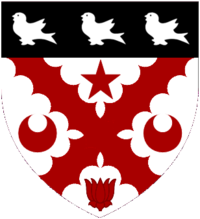David Anderson, 2nd Viscount Waverley
The Viscount Waverley | |
|---|---|
| Member of the House of Lords | |
Lord Temporal | |
| as a hereditary peer 4 January 1958 – 21 February 1990 | |
| Preceded by | The 1st Viscount Waverley |
| Succeeded by | The 3rd Viscount Waverley |
| Personal details | |
| Born | David Alastair Pearson Anderson 18 February 1911 |
| Died | 21 February 1990 (aged 79) |
| Spouse |
Lorna (m. 1948) |
| Children | 3, including John Anderson, 3rd Viscount Waverley |
| Parent |
|
| Education | Malvern College |
| Alma mater | |
| Occupation | Physician |
| Military service | |
| Allegiance | United Kingdom |
| Branch/service | Royal Air Force |
| Years of service | 1939–1945 (active) |
| Rank | Squadron leader |
| Unit | Medical Branch |
| Battles/wars | Second World War |
David Alastair Pearson Anderson, 2nd Viscount Waverley (18 February 1911 – 21 February 1990), was a British hereditary peer and physician. He trained as a physician in Germany and England, served in the Royal Air Force during the Second World War, and then specialised as a cardiologist. Having succeeded his father as Viscount Waverley in 1958, he also sat in the House of Lords where he regularly spoke on health matters and other interests of his.[1][2][3]
Early life and education
[edit]The son of John Anderson, later 1st Viscount Waverley, he was educated at Malvern College. He studied medicine at Goethe University Frankfurt and Pembroke College, Cambridge, graduating with Bachelor of Medicine, Bachelor of Surgery (MB, BChir) degrees in 1937.[1][2] He completed his clinical training at St Thomas's Hospital Medical School in London.[3]
Career
[edit]From 1938 to 1939, Anderson was a junior doctor at St Thomas' Hospital, London.[1][2] With the outbreak of the Second World War, he volunteered and joined the medical branch of the Royal Air Force.[2] He was commissioned on 25 September 1939 in the rank of flying officer.[4] He was one of the few doctors in the RAF that were also trained as pilots.[3] He was promoted to flight lieutenant on 25 September 1940,[5] and to squadron leader (temporary) on 1 July 1943.[6] He was demobilized after the end of the War in 1945,[1][3] and he relinquished his commission in 1956 having reached the age of 45 (at which point he was no longer obliged to remain in the reserves).[7]
After the war, he returned to St Thomas' Hospital and developed an interest in cardiology.[2] In 1951, he moved to the Reading Group of Hospitals where he worked as a consultant at the Royal Berkshire Hospital in Reading.[1] He developed his own teaching unit at the hospital, and also published a number of papers on cardiac and vascular disorders.[3] He retired in 1976.[2]
Anderson succeeded his father as Viscount Waverley upon the latter's death on 4 January 1958.[1] He first sat in the House of Lords on 20 May 1958,[8] and made his maiden speech on 19 November 1959 during a debate about the hospital service.[9]
Personal life
[edit]On 13 November 1948, Anderson married Lorna Myrtle Ann Ledgerwood (1925–2013).[10] Together they had three children: one son and two daughters.[1] Their son, John Anderson, succeeded to his father's title as the 3rd Viscount Waverley.[3]
Arms
[edit]  |
|
References
[edit]- ^ a b c d e f g "Waverley, 2nd Viscount cr 1952, of Westdean, (David Alastair Pearson Anderson)". Who Was Who. Oxford University Press. 1 December 2007. doi:10.1093/ww/9780199540884.013.U170237. ISBN 978-0-19-954089-1. Retrieved 25 June 2019.
- ^ a b c d e f Cox, E. V. "David Alastair Pearson (Viscount) Waverley". Munks Roll. Royal College of Physicians of London. Retrieved 25 June 2019.
- ^ a b c d e f "Viscount Waverley: Raising medical issues in the House of Lords debates". The Times. No. 63641. 28 February 1990. p. 16.
- ^ "No. 34705". The London Gazette. 10 October 1939. p. 6803.
- ^ "No. 35019". The London Gazette. 20 December 1940. p. 7124.
- ^ "No. 36092". The London Gazette (Supplement). 13 July 1943. p. 3211.
- ^ "No. 40750". The London Gazette (Supplement). 6 April 1956. p. 2091.
- ^ "Prayers". Parliamentary Debates (Hansard). Vol. 209. United Kingdom: House of Lords. 20 May 1958.
- ^ Viscount Waverley (19 November 1959). "THE HOSPITAL SERVICE". Parliamentary Debates (Hansard). Vol. 219. United Kingdom: House of Lords. col. 803–806.
- ^ "Waverley, Viscount (UK, 1952)". Cracroft's Peerage. Retrieved 25 June 2019.
- ^ Debrett's Peerage. 2019. p. 4725.
